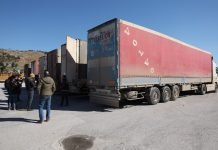
International humanitarian relief organizations are expressing concern about the failure of the UN Security Council to extend the authorization of the humanitarian cross-border mechanism in Syria.
The UN Security Council on July 11 failed to renew authorization of the delivery of humanitarian aid to Syria’s rebel-held northwest from neighboring Turkey, officially ending a UN operation that had been vital to helping a region of 4.1 million people. The region was also affected by devastating earthquakes that hit Turkey in early February.
The failure of the council “will put many lives at risk and undermine efforts to recover from the recent earthquakes,” Islamic Relief said, calling on the UN to renew the resolution for at least another 12 months.
““How can we allow the same regime that bombed its people, used chemical weapons against children, attacked hospitals and schools, and starved children to death in areas that were under its siege in Ghouta, Madaya, and Zanafani to control the aid delivery to 4.5 million people whom it has treated as enemies?” saidZaher Sahloul, chair of the Chicago-based MedGlobal.
MedGlobal operates several primary health care clinics, hospitals, mental health programs, a drug rehabilitation center and an ambulance system as well as medical training, nutrition and vaccination programs that serve hundreds of thousands of mostly internally displaced people in northern Syria in accordance with international humanitarian principles.
The council was not able to adopt either of two rival resolutions to authorize further deliveries through the Bab al-Hawa border crossing, where the latest six-month mandate expired last week.
A 7.8-magnitude earthquake that struck near the Turkish city of Gaziantep – home to around 2 million people and on the border with Syria – as people were sleeping on February 6 was followed by dozens of aftershocks, including a 7.5-magnitude temblor that jolted the region in the middle of search and rescue efforts the same day.
The Syrian leader, Bashar al-Assad, agreed to open two border crossing points in February for three months to allow in a greater volume of emergency aid for victims of the earthquakes.
The three-month period expired in mid-May, and the Syrian government extended it until August 13.
Following the failure of UN Security Council, Syria’s ambassador to the UN said Damascus would give voluntary permission for the UN to use the crossing for six months, on condition that aid delivery would be done “in full cooperation and coordination with the government.”
However, the UN Office for the Coordination of Humanitarian Affairs (OCHA), which is responsible for overseeing humanitarian aid, has described the conditions imposed by the Syrian government on aid deliveries from Turkey to northwest Syria as “unacceptable,” The Associated Press (AP) earlier reported.
In a letter sent to the Security Council on Friday, a copy of which was obtained by The AP, OCHA said the prohibition on communicating with groups considered “terrorist” by the Syrian government would prevent the UN and partner organizations distributing aid from engaging “with relevant state and non-state parties as operationally necessary to carry out safe and unimpeded humanitarian operations.”











